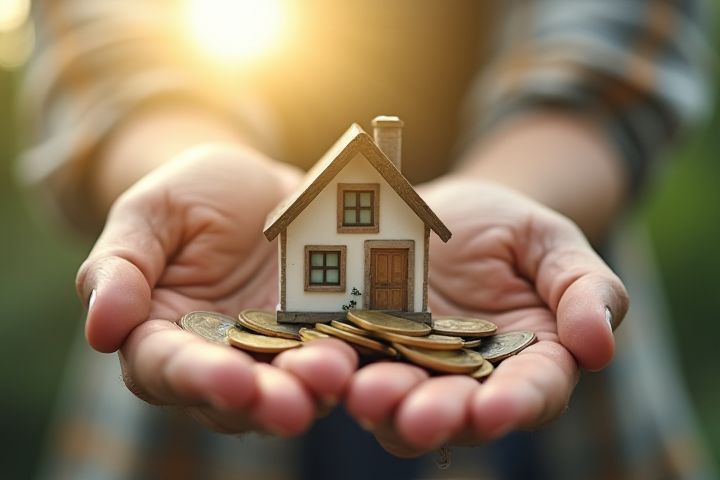
House equity grows primarily through two mechanisms: the appreciation of property values and the reduction of mortgage balances. When the real estate market experiences growth, the value of your home can increase significantly, contributing to higher equity. Simultaneously, as you make mortgage payments, you reduce the principal balance of your loan, thereby increasing your ownership stake in the property. Home improvements and renovations can also enhance your home's value, further boosting your equity. Monitoring market trends and maintaining your property can help maximize your investment in your home over time.
How Does House Equity Grow
Home Appreciation
Home appreciation significantly contributes to growing your house equity. Over the past decade, the average annual appreciation rate in the U.S. has been around 3-5%, depending on the region. For example, a home valued at $300,000 could appreciate to $360,000 in just five years with a modest 4% annual increase. As the market value of your home increases, so does your equity, enabling potential financial leverage for investment or renovation opportunities.
Mortgage Principal Payments
Mortgage principal payments play a critical role in the growth of your home equity. As you consistently pay down the principal amount of your mortgage, the remaining balance reduces, directly increasing your ownership stake in the property. This equity appreciation is further enhanced by the property's market value, which can rise over time due to factors such as neighborhood development and real estate trends. By effectively managing your mortgage payments, you can accelerate the build-up of equity, enabling you to leverage it for future investments or consider refinancing options.
Home Improvements
Home equity grows significantly through strategic home improvements, which can increase your property's market value. For instance, kitchen remodels can yield up to 80% return on investment (ROI), while bathroom renovations often deliver around 70% ROI, directly boosting your home's equity. Another impactful improvement is adding energy-efficient upgrades, such as new windows or solar panels, which not only enhance comfort but can also appeal to environmentally-conscious buyers. By investing a calculated amount--typically 5-15% of your home's value--into these improvements, you can substantially elevate your home's worth and, consequently, your equity.
Property Market Trends
House equity typically grows through a combination of increasing property values and paying down your mortgage. In metropolitan areas, properties have seen average appreciation rates of 3% to 5% annually, reflecting overall market demand and local economic conditions. Additionally, investing in home improvements can boost your property's value, further enhancing your equity. Staying informed about property market trends in your region can help you make strategic decisions that maximize your investment over time.
Economic Conditions
House equity growth is significantly influenced by economic conditions, particularly through changes in property values and mortgage rates. In a robust economy, rising job growth and increased consumer confidence can lead to higher demand for housing, driving up home prices. According to recent data, home prices increased by an average of 6.5% annually in 2021, reflecting strong market conditions. Furthermore, when interest rates remain low, more homeowners can refinance, reducing monthly payments and allowing a greater share of your payments to go towards building equity.
Demographic Changes
House equity grows significantly as demographic changes influence the real estate market. An increasing population of millennials, who are now entering their home-buying years, drives demand for suburban properties, thereby elevating home values. As diverse communities expand, the variety of housing options available can increase competition, leading to appreciation in property prices. With greater urbanization trends, homes in metropolitan areas often experience rapid equity growth due to limited supply and rising demand.
Low Borrowing Costs
Low borrowing costs can significantly enhance your home equity growth. As mortgage rates remain low, new homeowners can secure properties with minimal interest expenses, allowing a larger portion of their monthly payments to contribute toward principal reduction. Additionally, lower rates can incentivize refinancing at favorable terms, improving overall loan conditions and accelerating equity accumulation. By maintaining low borrowing costs, you can effectively leverage your property's appreciation while building financial stability.
Neighborhood Development
House equity grows primarily through appreciation in property values, which is significantly influenced by neighborhood development. When infrastructure improvements, such as parks, schools, and public transport, are made, local property values often rise, enhancing your home's worth. The influx of new businesses and community services can further boost demand for housing in the area, leading to increased home prices and, consequently, higher equity. Active community engagement and urban planning initiatives also play key roles in creating vibrant neighborhoods, positively impacting your investment in real estate.
Inflation
House equity can grow significantly as inflation increases property values over time. For instance, if your home appreciates at a rate of 3% annually while inflation averages 2%, your equity can increase by that net 1% annually. With the median home price in the U.S. at around $400,000, even a modest increase in value can lead to substantial equity growth, potentially adding tens of thousands of dollars over a decade. Understanding these dynamics is crucial for homeowners looking to leverage their property as a financial asset in an inflationary environment.
Longer Ownership Duration
As homeowners remain in their properties longer, the equity usually appreciates significantly due to consistent property value increases, averaging around 3-5% annually. Over a decade, for instance, a home valued at $300,000 could potentially increase to $400,000, leading to an equity growth of $100,000. With each mortgage payment, more of your principal is paid down, further elevating your equity; typically, 20% to 30% of the home's value can be realized in equity after 10 years of payments. This longer ownership duration not only fosters financial stability but also opens doors for future investments or funding major expenses through home equity loans or lines of credit.
